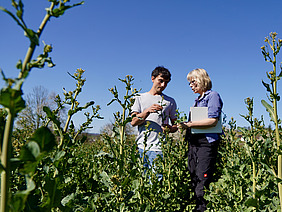The basic course on key topics in organic farming serves as an introduction for people who are interested in pursuing a career as an organic advisor. It provides the necessary background knowledge to understand the role of organic advisors and the broader context of organic farming in Europe.
The course is particularly suitable for:
- Students of agricultural sciences or related disciplines
- Graduates who would like to gain an insight into the organic sector
- Young professionals and people who are interested in working as organic advisors
Expertise and networking
Over the course of twelve weekly sessions, participants will acquire a basic understanding of organic farming systems and the diverse topics relevant to advisory work in this field. Each session is led by experienced professionals who provide both theoretical input and practical insights into the realities of organic advising. To promote networking and mutual learning, participants can exchange ideas, ask questions, and reflect on the course content together in online forums.
For more information about the course content and registration, please visit the project website (link below).
The online basic course is part of the broader activities of the OrganicAdviceNetwork, a project aimed at strengthening advisory capacities and networks across Europe. The project is funded by the European Commission and the Swiss State Secretariat for Education, Research, and Innovation (SERI).
Further information
Contact
- Ana Stephan
- Bernadette Oehen
Links
- organicadvicenetwork.space: Information and registration for the course
- organicadvicenetwork.eu: OrganicAdviceNetwork project website
- fibl.org: Project entry "OrganicAdviceNetwork" in the FiBL project database





